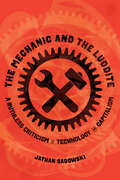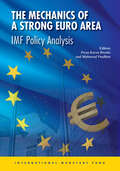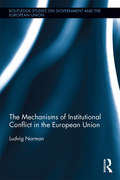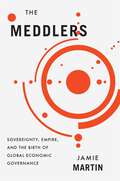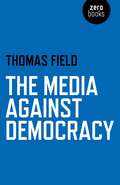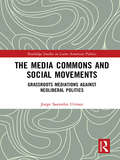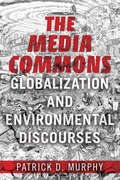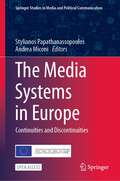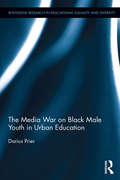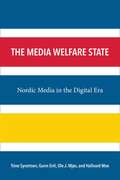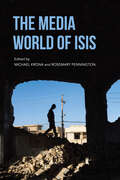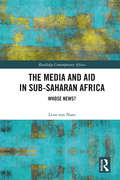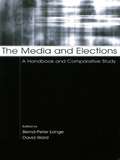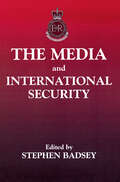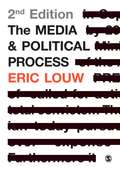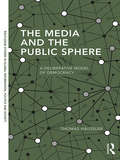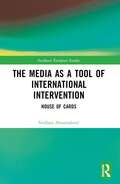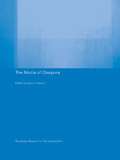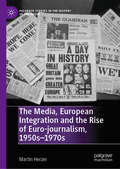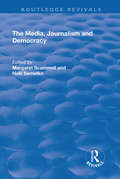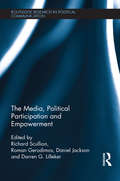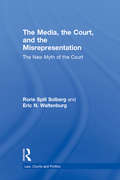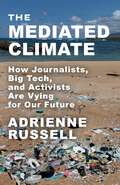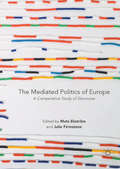- Table View
- List View
The Mechanic and the Luddite: A Ruthless Criticism of Technology and Capitalism
by Dr. Jathan SadowskiThis short book demystifies how the two systems of technology and capitalism work together and equips readers with practical tools to dismantle them and build a better world, bit by bit. Our society is constantly made to serve the needs of two systems: technology and capitalism. Neither exists outside humans, but both are treated as above and beyond us. The Mechanic and the Luddite offers the critical tools needed to deconstruct these systems—how they work, whom they work for, and what work they do in our lives. With signature style and energy, Jathan Sadowski presents a provocative one-stop shop for understanding the political economy of technology and capitalism. Each chapter breaks down key features of technological capitalism, offering sharp, synthetic, and authoritative analysis of topics like innovation, labor, data, and risk. It's not enough to know how the machinery of capitalism is put together and how its parts operate; we must also know whom the machines serve and when they should be taken apart, to be rebuilt for new purposes or destroyed for good. The Mechanic and the Luddite provides the political guidance needed to make these crucial decisions.
The Mechanics of a Strong Euro Area: Imf Policy Analysis
by Koeva Petya, Mahmood PradhanA report from the International Monetary Fund.
The Mechanisms of Institutional Conflict in the European Union (Routledge Studies on Government and the European Union)
by Ludvig NormanHow institutional conflicts arise in international political orders and the conditions shaping the outcomes of such conflicts has become the object of considerable contemporary focus. This book considers the dynamics of institutional conflict and institutional change in international organizations, specifically focusing on the European Union, the most highly integrated international political order on the globe. In a world where political decision making increasingly takes place above the nation state level, it theorises the social mechanisms that lead to the point at which these tensions become explicit and the customary functioning of international political orders tips into outright conflict between different organizational entities. Taking a constructivist approach, it examines two in-depth case studies - in the field of Justice and Home Affairs (JHA) and the EU’s Common Foreign and Security Policy (CFSP) - to explain the dynamics of the processes that lead up to institutional conflicts and provide some explanation for their final outcomes. This text will be of key interest to fields of and European Integration, EU Politics and more broadly International Relations.
The Meddlers: Sovereignty, Empire, and the Birth of Global Economic Governance
by Jamie MartinA pioneering history traces the origins of global economic governance—and the political conflicts it generates—to the aftermath of World War I. International economic institutions like the IMF and World Bank exert incredible influence over the domestic policies of many states. These institutions date from the end of World War II and amassed power during the neoliberal era of the late twentieth century. But as Jamie Martin shows, if we want to understand their deeper origins and the ideas and dynamics that shaped their controversial powers, we must turn back to the explosive political struggles that attended the birth of global economic governance in the early twentieth century. The Meddlers tells the story of the first international institutions to govern the world economy, including the League of Nations and Bank for International Settlements, created after World War I. These institutions endowed civil servants, bankers, and colonial authorities from Europe and the United States with extraordinary powers: to enforce austerity, coordinate the policies of independent central banks, oversee development programs, and regulate commodity prices. In a highly unequal world, they faced a new political challenge: was it possible to reach into sovereign states and empires to intervene in domestic economic policies without generating a backlash? Martin follows the intense political conflicts provoked by the earliest international efforts to govern capitalism—from Weimar Germany to the Balkans, Nationalist China to colonial Malaya, and the Chilean desert to Wall Street. The Meddlers shows how the fraught problems of sovereignty and democracy posed by institutions like the IMF are not unique to late twentieth-century globalization, but instead first emerged during an earlier period of imperial competition, world war, and economic crisis.
The Media Against Democracy
by Thomas FieldThe Media does not know what democracy is. Indeed our societies have, for the most part, forgotten the meaning of democracy. Democracy is not a state form. Democracy is a mode of foundationless existential living. As such it needs the kind of attention which our self-satisfied media institutions, riven with complacent journalistic practices and corrupted by institutional privilege, are incapable of. We need to sweep away The Media to allow existential democracy to manifest itself. This will also entail the destruction of key aspects of the academic institution of Media and Cultural Studies, which has evidently failed to radically change the nature of media institutions and practices which was its avowed aim. It has failed because of the epistemological and ontological assumptions that underpin it and which were ultimately drawn from the failed project of structuralism. The images we create arise from chaos. Images of value are in Castoriadis&’ expression &‘windows upon the chaos&’. The Media Against Democracy is engaged in rethinking the possibilities for aesthetic engagement with this chaos, proposing an existential-anarchic critique of media. Through our images and sounds we need to learn to understand ontological chaos, only then can we know that whatever we create, when we try to explain to each other how we should live, has no authority other than what we can accord it.
The Media Commons and Social Movements: Grassroots Mediations Against Neoliberal Politics (Routledge Studies in Latin American Politics)
by Jorge Saavedra UtmanWhat does it mean to have a voice in a formal democracy operating under neoliberal guidelines and with an almost entirely private media system? How can the people gain their voice and engage in a dialogue with hegemonic actors and discourses? In this book, Jorge Saavedra Utman examines the role of media and communicative practices during one of the largest social mobilizations in Latin America in the last 30 years: Chile’s 2011 students’ movement. Saavedra Utman observes the eye-catching, subversive, but also intimate practices that, in a country with a liberal democracy and neoliberal policies, allowed people to speak up and become political actors from grassroots positions. Presenting rich qualitative data that is sourced from interviews and focus groups with activists, he introduces a fresh perspective on the study of media and communications and social movements. Saavedra Utman paints a clearer picture of contentious events since 2011 - like the Arab Spring and Occupy – to understand the relevance of media and communications in contemporary quests for participation and democracy. Promising to be an important book, The Media Commons and Social Movements represents a significant contribution to our understanding of communicative dimensions of protest and social change.
The Media Commons: Globalization and Environmental Discourses
by Patrick D MurphyToday's global media sustains a potent new environmental consciousness. Paradoxically, it also serves as a far-reaching platform that promotes the unsustainable consumption ravaging our planet. Patrick Murphy musters theory, fieldwork, and empirical research to map how the media communicates today's many distinct, competing, and even antagonistic environmental discourses. The media draws the cultural boundaries of our environmental imagination--and influences just who benefits. Murphy's analysis emphasizes social context, institutional alignments, and commercial media's ways of rendering discussion. He identifies and examines key terms, phrases, and metaphors as well as the ways consumers are presented with ideas like agency and the place of nature. What emerges is the link between pervasive messaging and an "environment" conjured by our media-saturated social imagination. As the author shows, today's complex, integrated media networks shape, frame, and deliver many of our underlying ideas about the environment. Increasingly--and ominously--individuals and communities experience these ideas not only in the developed world but in the increasingly consumption-oriented Global South.
The Media Relations Department of Hizbollah Wishes You a Happy Birthday: Unexpected Encounters in the Changing Middle East
by Neil MacfarquharWith his counterintuitive sense since his boyhood in Qadhafi's Libya that the Middle East, despite all the bloodshed in its recent history, is a place of warmth, humanity, and generous eccentricity, Neil MacFarquhar introduces a cross-section of unsung, dynamic men and women pioneering political and social change. The author interacts with Arabs and Iranians in their every day lives, removed from the violence we see constantly, yet wrestling with the region's future.
The Media Systems in Europe: Continuities and Discontinuities (Springer Studies in Media and Political Communication)
by Stylianos Papathanassopoulos Andrea MiconiThis open access book traces the evolution of the European media landscape in the last 30 years, from 1990 to 2020. It is based on the theoretical classical hypotheses of regional media systems provided by Hallin and Mancini and at the same time puts them to test. The book further defines the proportions between geocultural patterns – national, regional, European, and global – to outline evolutionary trends in media landscapes. It analyzes to which degree European media have become more European, in the historical course of administrative unification and breaks the results down into concrete indexes and indicators. The book discusses the media systems of the member states of the European Union through a regional perspective, identifying similarities, differences, as well as their convergence in the digital age. It sheds light on the evolution of media systems in Europe, introduces existing relevant theoretical perspectives, and offers an overview of the new developments in European media.The book will appeal to students, researchers, and scholars of political science, communication, media, cultural, and policy studies, as well as practitioners and professionals interested in a better understanding of the European media landscape's evolution.
The Media War on Black Male Youth in Urban Education (Routledge Research in Educational Equality and Diversity)
by Darius PrierNews media, film, and the music industry have become powerful sources of misrepresentation of Black male life in the social imagination of white society. The pedagogy of popular culture has important implications for educators and youth advocates who desire to challenge the myths and distortions that ultimately harm youth. This volume raises awareness of the media war on Black male youth in popular culture, and the impact this image battle has on the discriminatory treatment of the population in urban educational settings. Citing the recent controversial deaths of Trayvon Martin and Jordan Davis, the portrayal of black males in contemporary films, and the locus of hip-hop masculinities, this volume offers a unique framework for analyzing how contemporary image-making practices affect Black male youth in urban education. It also offers ethical considerations for educators in their critique, consumption and reading of Black male subjectivity in media, and provides avenues for practical applications of critical media literacy on the ground.
The Media Welfare State: Nordic Media In The Digital Era
by Ole J. Mjøs Hallvard Moe Trine Syvertsen Gunn Sara EnliThe Media Welfare State: Nordic Media in the Digital Era comprehensively addresses the central dynamics of the digitalization of the media industry in the Nordic countries--Sweden, Norway, Denmark, Finland, and Iceland--and the ways media organizations there are transforming to address the new digital environment. Taking a comparative approach, the authors provide an overview of media institutions, content, use, and policy throughout the region, focusing on the impact of information and communication technology/internet and digitalization on the Nordic media sector. Illustrating the shifting media landscape the authors draw on a wide range of cases, including developments in the press, television, the public service media institutions, and telecommunication.
The Media World of ISIS (Indiana Series in Middle East Studies)
by Edited by Michael Krona and Rosemary PenningtonThis anthology explores how ISIS used media and propaganda, shedding light on the characteristics, mission, and tactics of its messaging.From efficient instructions on how to kill civilians to horrifying videos of beheadings, no terrorist organization has more comprehensively weaponized social media than ISIS. Its strategic, multiplatformed campaign is so effective that it has ensured global news coverage and inspired hundreds of young people around the world to abandon their lives and their countries to join a foreign war.Contributors consider how ISIS’s media strategies imitate activist tactics, legitimize its self-declared caliphate, and exploit narratives of suffering and imprisonment as propaganda to inspire followers. Using a variety of methods, contributors explore the appeal of ISIS to Westerners, the worldview made apparent in its doctrine, and suggestions for counteracting the organization’s approaches.Its highly developed, targeted, and effective media campaign has helped make ISIS one of the most recognized terrorism networks in the world. Gaining a comprehensive understanding of its strategies will help combat the new realities of terrorism in the twenty-first century.
The Media and Aid in Sub-Saharan Africa: Whose News? (Routledge Contemporary Africa)
by Lena von NasoNews coverage on Africa is closely connected not only with how Western audiences see the continent, but also with how a wide Western audience builds its opinion on issues that carry consequences for the public's and governments' support and policy towards development aid. The Western media reinforce a picture of a continent that drowns in chaos, is dominated by conflicts, diseases, corruption and failed democratisation. Whose interests lie behind that? How does foreign news on sub-Saharan Africa emerge, which actors are relevant in its making, and on the basis of what interests do these actors shape the coverage that is then presented as 'neutral information' to a broad international audience? Closely examining the relationship between foreign correspondents of international news media and humanitarian organisations, Lena von Naso shows how the aid and media sectors cooperate in Africa in a unique way. Based on more than 70 interviews with foreign correspondents and aid workers operating across Africa, the book argues that the changing nature of foreign news and of aid is forcing them to form a deep co-dependency that is having a serious and largely unnoticed effect on Western news coverage. This comprehensive examination of a new paradigm will interest students and scholars of media and journalism, African studies, development and humanitarian studies and the aid and media communities operating across Africa.
The Media and Elections: A Handbook and Comparative Study (European Institute for the Media Series)
by David Ward Bernd-Peter LangeThis comparative study brings together academics and practitioners who work in the field of media and elections to provide a set of national case studies and an analysis of the legal and regulatory frameworks that are employed by nation states to ensure that the media perform according to certain standards during election periods. In setting out the legal and regulatory framework each chapter provides an account of the socio-political conditions and media environment in each of the countries and subsequently details the laws that govern the print and broadcast media during election campaign periods. The countries included are France, Germany, Italy, Russia, South Africa, the United States, and the United Kingdom. A set of reflections by a Member of the European Parliament and a set of recommendations for good practice in media and elections are also included. Thus, the book is organized to provide a practical guide so that it can be used as a handbook.
The Media and International Security (The Sandhurst Conference Series #Vol. 1)
by Stephen BadseyA collection of the papers from the 1995 Sandhurst conference presented by leading members of the armed forces, the media and academia. The conference marked a major advance in British thinking on this very topical and fast-moving subject, bringing together authorities from various fields in a multidisciplinary investigation which has been, and will be of great interest to a wide variety of specialist readers.
The Media and Political Process
by P. Eric LouwHas the mediaization of politics played any role in encouraging a growing cynicism and disillusionment with political processes in Western democracies? This book examines the increasingly topical subject of the political process and assesses: - The nature of the relationship between mass media and the political process - The impact of media-ization on existing political frameworks - The implications of media-ized politics Eric Louw uses a number of case-studies including political, celebrity, war and terrorism to provide a media studies perspective on how media workers (journalists, public affairs officers, spin-doctors) impact upon the political process. The book also considers the media's role in promoting a range of twentieth century ideologies and emerging dominant discourses. It will be important reading for students of Media, Politics, Cultural Studies; Journalism and Public Relations.
The Media and the Public Sphere: A Deliberative Model of Democracy (Routledge Studies in Global Information, Politics and Society)
by Thomas HäusslerAt the heart of modern democracy lies the public sphere, which is most centrally shaped by those actors that integrate it discursively: the mass media. The media draw together the different strands of political debates; they grant access to some actors and arguments while excluding others and thus decisively mould the political process. In this book, Thomas Häussler examines how the media reflect and react to the wider context in which they are embedded. More specifically, he focuses on whether their discourse demonstrates systematic differences with regard to the two main public sphere types that they co-constitute, according to deliberative theory, focussing in particular on the work of Jürgen Habermas. The Media and the Public Sphere promotes a deeper and more detailed understanding of the political process by foregrounding the complex relationships between the media and the public discourse they constitute. It examines how the media co-create relationships of power, analyses the structure of these discursive networks and illuminates the effects that different deliberative coalition types have on political debates.
The Media as a Tool of International Intervention: House of Cards (Southeast European Studies)
by Nidžara AhmetaševićThis book explores the role of external powers and international organisations in media assistance in Bosnia and Herzegovina. Through analysis of key documents, media reports and interviews with key participants it examines the main actors, their roles and the way in which they influenced the media and society. Bosnia and Herzegovina remains one of the biggest experiments in international intervention in modern history. Media assistance, as well as international intervention, was an enormous project which involved many donors and recipient organisations, and large amounts of money, but it is just one of many countries where democratisation and state-building took place with little to no input from the local community. Since the mid-1980s, media assistance has been an integral part of international intervention used as a tool of democratisation in post-conflict countries and societies. The process is often led and created outside these countries and implemented by various international organisations, led by technocrats and dictated by the will of donors. The author uses the case study of Bosnia and Herzegovina to assess this in a broader context. This volume will be of interest to scholars and students of Southeast Europe, international organisations, peace-building, and rebuilding society in post-war countries, as well as journalists and policy-makers.
The Media of Diaspora: Mapping the Globe (Routledge Research in Transnationalism #Vol. 7)
by Karim H. KarimThe Media of Diaspora examines how diasporic communities have used new communications media to maintain and develop community ties on a local and transnational level. This collection of essays from a wide range of different diasporic contexts is a unique contribution to the field.
The Media, European Integration and the Rise of Euro-journalism, 1950s–1970s (Palgrave Studies in the History of the Media)
by Martin HerzerThis book explains how the media helped to invent the European Union as the supranational polity that we know today. Against normative EU scholarship, it tells the story of the rise of the Euro-journalists – pro-European advocacy journalists – within the post-war Western European media. The Euro-journalists pioneered a journalism which symbolically magnified the technocratic European Community as the embodiment of Europe. Normative research on the media and European integration has focused on how the media might help to construct a democratic and legitimate European Union. In contrast, this book aims to deconstruct how journalists – as part of Western European elites – played a key role in elite European identity building campaigns.
The Media, Journalism and Democracy (The\international Library Of Politics And Comparative Government Ser. #14)
by Margaret Scammell Holli SemetkoThis title was first published in 2000. Offering original insights into the relationship between media and democratic theory, this volume brings together a renowned collection of international specialists who examine media and democracy, professional journalism, the anatomy of content and the current issues which concern both institutions. Challenging conventional discourse, this comprehensive collection contains the most incisive and informative articles on this fundamental subject.
The Media, Political Participation and Empowerment (Routledge Research in Political Communication)
by Daniel Jackson Darren G. Lilleker Roman Gerodimos Richard ScullionTechnological, cultural and economic forces are transforming political communication, posing challenges and opportunities for politicians and media organisations, while at the same time many governments and civil society express concerns about the extent and nature of political empowerment and civic engagement. This book offers an international perspective on current thinking and practice about civic and audience empowerment, focusing on the ways and means through which media can empower or dis-empower citizens as audiences. It features theoretical and empirical chapters that draw specific attention to a reappraisal of the theories, methods and issues that inform our understanding of citizens and audiences in contemporary politics. The authors address the following questions: How much and what sorts of civic and audience empowerment are most desirable, and how does this differ cross-nationally? How do citizens relate to private and public spaces? How do citizens function in online, networked, liminal and alternative spaces? How do audiences of ‘non-political’ media spaces relate their experiences to politics? How are political parties and movements utilising audiences as co-creators of political communication and what are the consequences for democracy? With examples from the UK, USA, Holland, France, Germany, The Middle East, South Africa and Mexico, this innovative volume will be of interest to students and scholars of political science, marketing, journalism, cultural studies, public relations, media and international relations.
The Media, the Court, and the Misrepresentation: The New Myth of the Court (Law, Courts and Politics)
by Rorie Spill Solberg Eric N. WaltenburgThe Court’s decisions are interpreted and disseminated via the media. During this process, the media paints an image of the Court and its business. Like any artist, the media has license regarding what to cover and the amount of attention devoted to any aspect of the Court and its business. Some cases receive tremendous attention, while others languish on the back pages or are ignored. These selection effects create a skewed picture of the Court and its work, and might affect public attitudes toward the Court. Indeed, studies of media coverage of other governmental institutions reveal that when, and how, their policy decisions are covered has implications for the public’s understanding of, compliance with, support for, and cynicism about the policy. This book uncovers and describes this coverage and compares it to the confirmation hearings, the Court’s actual work, even its members. Rorie Spill Solberg and Eric N. Waltenburg analyze media coverage of nominations and confirmation hearings, the justices’ "extra-curricular" activities and their retirements/deaths, and the Court’s opinions, and compare this coverage to analyses of confirmation transcripts and the Court’s full docket. Solberg and Waltenburg contend that media now cover the Court and its personnel more similarly to its coverage of other political institutions. Journalists still regurgitate a mythology supported by the justices, a "cult of the robe," wherein unbiased and apolitical judges mechanically base their decisions upon the law and the Constitution. Furthermore, they argue the media also focus on the "cult of personality," wherein the media emphasize certain attributes of the justices and their work to match the public’s preferences for subject matter and content. The media’s portrayal, then, may undercut the Court’s legitimacy and its reservoir of good will.
The Mediated Climate: How Journalists, Big Tech, and Activists Are Vying for Our Future
by Adrienne RussellTo what extent does journalism deserve blame for the failure to address climate change over the last thirty years? Critics point out that climate coverage has often lacked necessary urgency and hewed to traditional notions of objectivity and balance that allowed powerful interests—mainly fossil fuel companies—to manufacture doubt. Climate journalism, however, developed alongside the digital media landscape, which is characterized by rampant misinformation, political polarization, unaccountable tech companies, unchecked corporate power, and vast inequalities. Under these circumstances, journalism struggled, and bad actors flourished, muddling messages while emissions mounted and societies struggled to avert catastrophe.The Mediated Climate explores the places where the climate and information crises meet, examining how journalism, activism, corporations, and Big Tech compete to influence the public. Adrienne Russell argues that the inadequate response to climate change is intertwined with the profound challenges facing the communications environment. She demonstrates that the information crisis is driven not only by technological changes but also by concentrated power that predates the rise of digital media companies. Efforts to improve climate coverage must take into account the larger social and material contexts in which journalism operates and the broader power dynamics that shape public discourse. Drawing on interviews with journalists and activists, Russell considers the ways recent movements are battling misinformation. She offers timely recommendations to foster engagement with climate issues and calls on readers to join in efforts to reshape the media landscape to better serve the public interest.
The Mediated Politics of Europe
by Mats Ekström Julie FirmstoneThis edited collection makes a unique contribution to analyses of the changing nature and challenges of mediated political communication, through a distinctive comparative discourse analytical approach. The book explores how politics is performed and discursively constructed in television news and current affairs in five countries (France, Greece, Italy, Sweden and the UK) and focuses on a moment in time in European politics characterized by challenging tensions; increased Euroscepticism, questioning of mainstream politics; accentuated gaps between the elite and the citizens, and polarizations between member states. Emphasising the performative and discursive dimensions of political communication, the chapters provide a detailed comparative analysis that is centred around three themes: how symbolic representations of politics are shaped by journalistic practices, genres and styles of news reporting; the language and performances of mainstream and populist political leaders; and the participation and representation of citizens' voices.
